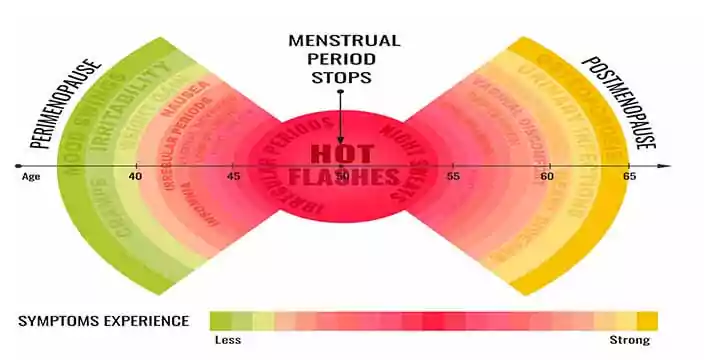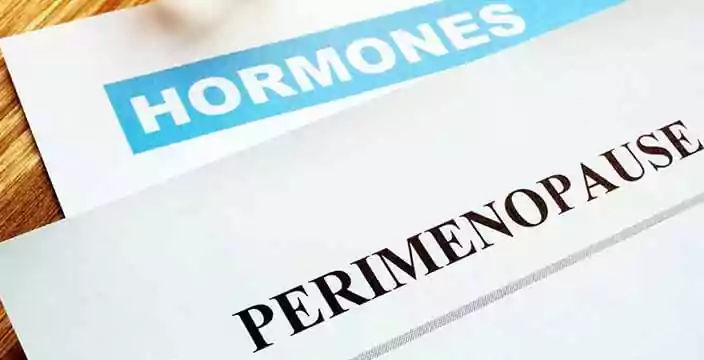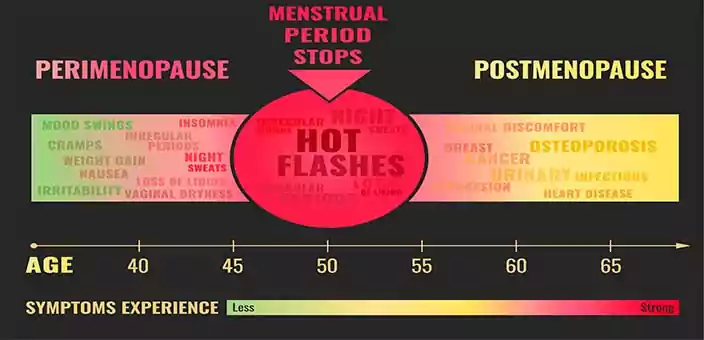PCOS test is based on the Rotterdam criteria for diagnosing PCOS.

Menopause
Your periods are getting a bit irregular, your skin feels super dry, you feel bloated several times a week, your memory is foggy, and sometimes you wake up sweating in the middle of the night. It’s all a bit disturbing, we agree. But, before you start googling your symptoms, worried that you might be dealing with some life-threatening illness, here’s a thought for you. If you’re over 35 years of age, chances are that you’re just experiencing the symptoms of Perimenopause.

Now, what on earth is perimenopause? Most of us have heard of menopause – the end of menstruation and fertility that most women experience in their late 40s to 50s. But the transition to menopause can begin several years earlier, and this phase is known as perimenopause.
Perimenopause can begin 8 to 10 years before you officially hit menopause. Most women begin experiencing perimenopause symptoms when they’re in their late 30s to early 40s. With age, the ovaries reduce production of estrogen and progesterone, causing perimenopause. Your estrogen levels may fluctuate sporadically, going up or down, which can hinder with your normal 28-day menstrual cycle. This is why your periods have become irregular and hard to predict.
During perimenopause, the ovaries are still producing estrogen (albeit, in lower levels) so you still have periods – they just don’t follow their usual pattern. You can also get pregnant during perimenopause.
This pattern continues until the ovaries start producing very little estrogen. The first stage is that the low estrogen is unable to stimulate the release of an egg from your ovaries, which is meant to happen every period cycle. Release of an egg is what triggers production of progesterone, so this first stops. When this low estrogen phase continues for a period of time, eventually, your periods end altogether. Menopause officially kicks in when you haven’t had a period in the last 12 months. But if you still experience occasional spotting or have a period every few months, you are still in perimenopause phase.
Bear in mind, sometimes perimenopause can happen sooner for some women, especially if:

Perimenopause is a natural biological process that is a part of aging. It’s not an illness, and it’s nothing to be afraid of. However, some women may experience disturbing symptoms of perimenopause that can be treated with natural therapies, a healthy diet, regular exercise and alternative treatments.
So, what are these symptoms
As you age, and your reproductive ability begins to diminish, estrogen levels start to fluctuate, since your ovaries are unable to produce estrogen its previous predictable pattern. Since estrogen is the hormone that builds the inner lining of your uterus each month, irregular estrogen production results in the uterine lining not being built properly and it may be shed in small amounts in an unpredictable pattern. You may notice light spotting some months, occurring without any set pattern.
On the other hand, the lengthened time gap between two periods may cause uterine lining or endometrium to become quite thick between proper periods. This means that when you do have your period – the flow is very heavy. And can come with blood clots and severe cramps.
As your periods become irregular, you may notice that your PMS symptoms worsen. You may have headaches during your period and suffer from severe cramping, soreness and mood changes. This is happening because the hormones estrogen and progesterone play multiple roles in your body beyond reproduction. One of their important roles is to help you manage stress better. When their production reduces, your PMS symptoms get far worse.
As we age, estrogen levels start to wane and the ovaries stop producing eggs regularly. Additionally, age can also result in diminished quality of eggs. If you’re in your late 30s and trying to get pregnant, perimenopause can make it harder to conceive. However, do not assume that decreased fertility means you cannot get pregnant and stop using contraception if you don’t want to get pregnant. As long as you’re in perimenopause, you can still get pregnant.
Changing estrogen levels can make your breasts feel sore, heavy ad tender. As estrogen production becomes erratic during perimenopause, your breasts may feel swollen or lumpy due to fluid retention. Considering that lengthened time interval between ovulation and periods during perimenopause, breast tenderness can feel worse than before.
Hot flashes are not just for menopausal women. In fact, they can start several years earlier, during perimenopause, and often come as a surprise. A hot flash is an intense sensation of heat in the face, neck and chest that causes sweating or chills. Caused due to estrogen deficiency, hot flashes can make it harder to concentrate on work or chores, particularly in warmer weather.
When hot flashes occur at night, they are termed as night sweats. During perimenopause, fluctuating estrogen levels can awaken you from sleep with profuse sweating. This can lead to sleep disturbances, insomnia and fatigue.
Perimenopause comes with sporadically fluctuating levels of estrogen due to disruption in hormonal balance. As a result, day to day production of estrogen becomes unpredictable. When estrogen levels go up, you may experience nausea.
Sometimes during perimenopause the overall production of estrogen in the ovaries increases, even though day-to-day production becomes unpredictable. Another symptom of higher-than-usual estrogen levels is bloating. Excess estrogen in the body leads to fluid retention, and you may notice swelling, tightness and fullness in the abdominal area.
Fluctuating levels of estrogen in your body during perimenopause can also increase gastrointestinal distress. You may suddenly notice constipation or slow digestion, accompanied by bloating. Some women also complain of increased flatulence, gas pain, indigestion and nausea after eating, all reflecting digestive changes caused by hormonal imbalance.
Some of your recent weight gain may be caused by fluid retention. However, fluctuating estrogen levels also interferes with appetite regulation, causing you to eat more than usual. Some women also report more food cravings when their hormones are out of sync. Reduced estrogen levels may also slow down metabolism. All these factors contribute towards weight gain during perimenopause.
Oscillating estrogen levels can make it harder for you to focus and concentrate. It’s not uncommon for women to experience foggy thinking and memory lapses during perimenopause. This can add to your stress levels and anxiety when lack of concentration interferes with work and chores.
Some women report severe dryness and skin irritation during perimenopause. For others, the acne they thought they were done with post adolescence returns with a vengeance. Changing hormone levels can bring with them undesirable skin changes which also include – dark circles under eyes, puffy eyes, increase in facial hair or unusual hair growth around nipples and breasts. It’s not just skin though, you may also notice that your nails become brittle and hair fall increases as hormones fluctuate.
Hormonal oscillations make it harder for you to get a good night’s sleep. Night sweats are a common factor. Studies have found that perimenopausal women experience more sleep disturbances just prior to menstruation, during the luteal phase, than they did during the phase after menstruation, the follicular phase, as the hormone progesterone influences sleep.
Fluctuating hormone levels during perimenopause can lead to mood swings, irritability, feeling low, anxiety and depression. These are more commonly seen in women who experience night sweats, due to lack of sleep, fatigue and exhaustion.
As estrogen levels fall, it can cause LDL or bad cholesterol levels to rise. These lipid changes increase risk of cardiovascular disease and should be fixed with healthy lifestyle changes.
Lowered levels of estrogen can cause lowered sex drive. Studies have found that a close association exists between increasing irregularity of menstrual cycles, hot flashes, declining estrogen levels, and declining frequency of intercourse during the perimenopause.
Estrogen is crucial for maintaining vaginal health. Lowered estrogen levels can lead to vaginal dryness. Loss of hydration from vaginal tissue and thinning of vaginal walls further contribute to reduced sex drive, as intercourse becomes more painful.
Low systemic levels of estrogen can lead to a variety of bladder problems. You may notice that you become more susceptible to urinary tract infections (UTIs) during perimenopause. Estrogen decline can also cause urinary urgency, where you feel the need to urinate frequently. In some cases, urinary incontinence may also occur where small amount of urine may leak out during coughing, sneezing, laughing or lifting a heavy object.
Estrogen is intrinsically linked with maintain bone density. As estrogen levels diminish or fluctuate erratically, bones can become depleted of calcium. This leads to reduced bone density which can cause osteoporosis with time. It’s very important for perimenopausal women to maintain bone density.
As estrogen levels wane, your immune system weakens too. This makes you more susceptible to seasonal allergies.
While these are the common symptoms of perimenopause, you can now see that it is just the precursor to menopause. The list of menopause symptoms[SA1] is slightly longer, so if your perimenopause symptom is not listed here, do check that out too.
If these distressing symptoms of perimenopause are interfering with your quality of life, we highly recommend natural remedies and alternative therapies to minimize your symptoms.
The Sepalika Menopause Programme is scientifically designed to help women deal with all the other symptoms of peri-menopause and menopause. Each person’s treatment is tailor-made as per their symptoms, medical history and lab test results. Progress is tracked till you get better and expert supervision is available throughout the programme. Write to us at health@sepalika.com for more information and to speak to a Health Coach today! Note: Program open only to people in India
This article has been co-authored by Maneera Saxena Behl, a health and fitness who likes to help others improve their overall well-being by achieving the right balance between nutrition, exercise and mindfulness.
Hormone fluctuations disrupt sleep of perimenopausal women – https://www.sciencedaily.com/releases/2015/06/150616131534.htm
Relationships among sexual behavior, hot flashes, and hormone levels in perimenopausal women – https://link.springer.com/article/10.1007/BF01542000